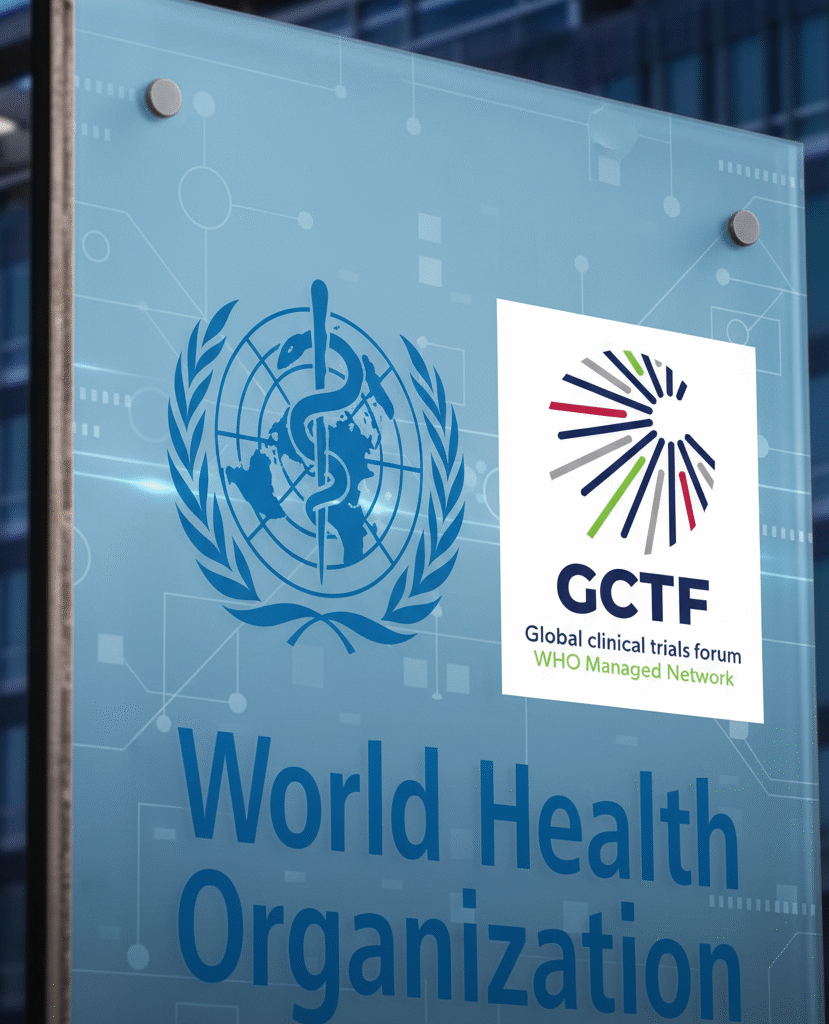Written By: Arbaz Saiyyad BSc, BPharm
Reviewed By: Pharmacally Editorial Team
On 7 October 2025, the World Health Organization officially launched the Global Clinical Trials Forum (GCTF), an initiative aimed at raising global standards for clinical research, harmonizing practices, and strengthening capacity across all regions. Managed by WHO, the Forum is a multi-stakeholder network that supports the implementation of WHO’s Guidance for Best Practices for Clinical Trials and the Global Action Plan for Clinical Trial Ecosystem Strengthening (GAP-CTS). It focuses on nine priority areas, addressing gaps in regulation, infrastructure, ethics, data systems, workforce, financing, inclusion, and evaluation.
From its inception, the GCTF is structured not as a separate regulator or funding body, but as a coordinating platform. Member states, regulatory authorities, ethics committees, funders, academic institutions, civil society groups, and patient advocacy organizations will participate through thematic working groups to share experiences, develop practical tools, and promote the adoption of best practices. The Forum focuses on nine key areas: strengthening regulation and ethics, building digital platforms and data systems, developing the workforce, embedding trials within health systems, promoting inclusion and equity, ensuring sustainable financing, enhancing transparency and data sharing, monitoring and evaluation, and fostering stakeholder collaboration.
The GCTF is designed to coordinate with existing global standards and frameworks, including the International Council for Harmonization (ICH) guidelines and the Declaration of Helsinki. While it does not replace these frameworks, the Forum aligns its guidance with ICH principles, particularly Good Clinical Practice (E6) and general considerations for trial design (E8), to ensure scientific rigor and global consistency. Similarly, it integrates the ethical principles of the Declaration of Helsinki, emphasizing respect for participants, beneficence, justice, and transparency. By building on these established standards, the GCTF supports countries in adopting globally recognized best practices while tailoring implementation to local needs.
At the launch, officials and leaders underscored both the urgency and promise of this forum. The Health Research Authority (UK), a founding member, expressed strong support. Naho Yamazaki, Deputy Director of Policy and Partnerships at HRA, remarked:
“We are delighted to be among the launch members of the Global Clinical Trials Forum,” said Naho Yamazaki, Deputy Director of Policy and Partnerships at the UK Health Research Authority. “Sharing best practices and lessons with partners worldwide is a key way to improve the quality of clinical trials in the UK. We are already discussing ethics review, research transparency, public involvement, and how to ensure representative trial populations, and we welcome ongoing dialogue through GCTF.”
From the evidence synthesis field, Karla Soares-Weiser, CEO of Cochrane, described the launch as “a pivotal moment for global health research.” She noted that strengthening clinical trial systems and promoting collaboration across sectors will help ensure that high-quality evidence is available when it is needed most.
Other key voices, especially from the funding community, had already set the stage for this initiative. In a joint statement released shortly before the launch, leading medical research funders pledged to align their efforts with WHO standards. They committed to integrating trials into national health systems, improving study design, promoting transparency, and ensuring diverse and representative participation. Leaders such as Professor Steve Wesselingh from Australia’s NHMRC and Dr. Pramod Joshi from Nepal’s Health Research Council emphasized the need for well-coordinated and sustainable trial systems across countries.
The GCTF’s membership roster is broad. Launch members include the Indian Council of Medical Research, Egypt Drug Authority, Health Research Authority (UK), National Institute for Health and Care Research (UK), Singapore Clinical Research Institute, Christian Medical College Vellore, Cochrane, Medicines for Malaria Venture, CEPI, The Global Health Network, University of Oxford, and IFPMA, among others. These organizations will convene through the thematic groups to develop implementation guides, capacity building modules, shared metrics, harmonized regulatory tools, and peer learning platforms.
The Global Clinical Trials Forum offers several key advantages. It aims to make regulatory and ethics processes faster and more consistent across countries, strengthen trial capacity in low- and middle-income regions, and ensure better inclusion of underrepresented groups. It also promotes higher data quality, greater transparency, and closer integration of trials within health systems. For researchers and sponsors, the Forum can reduce duplication, simplify multi-country trial procedures, and improve the reliability of evidence. For patients and communities, it promises fairer access to studies, stronger participant protection, and more trustworthy results.
That said, the GCTF will also face important challenges. Member states must build trust and adopt shared standards while maintaining their own regulatory independence. Limited funding, weak infrastructure, and shortage of skilled staff may slow progress in low-resource countries. Working with many different stakeholders can also delay agreement. Turning these plans into real action—not just policy statements will require strong monitoring, clear evaluation, accountability, and committed leadership.
In summary, the Global Clinical Trials Forum marks a major step toward replacing fragmented and uneven trial systems with a more coordinated, fair, and resilient global research network. By aligning with existing frameworks such as ICH and the Declaration of Helsinki, the Forum strengthens both the scientific and ethical foundations of clinical research. Its success will depend on ongoing collaboration, joint investment, and steady adaptation. Even so, the launch has already created a strong sense of optimism, cooperation, and shared responsibility within the global research community.
References
WHO launches the Global Clinical Trials Forum, 07 October 2025, World Health Organization, https://www.who.int/news/item/07-10-2025-who-launches-the-global-clinical-trials-forum
Strengthening clinical trials, World Health Organization, https://www.who.int/our-work/science-division/research-for-health/implementation-of-the-resolution-on-clinical-trials
WHO Global Clinical Trials Forum (GCTF), https://www.who.int/initiatives/global-clinical-trials-forum
Current list of GCTF Members, World Health Organization, https://www.who.int/initiatives/global-clinical-trials-forum/membership/gctf-members

